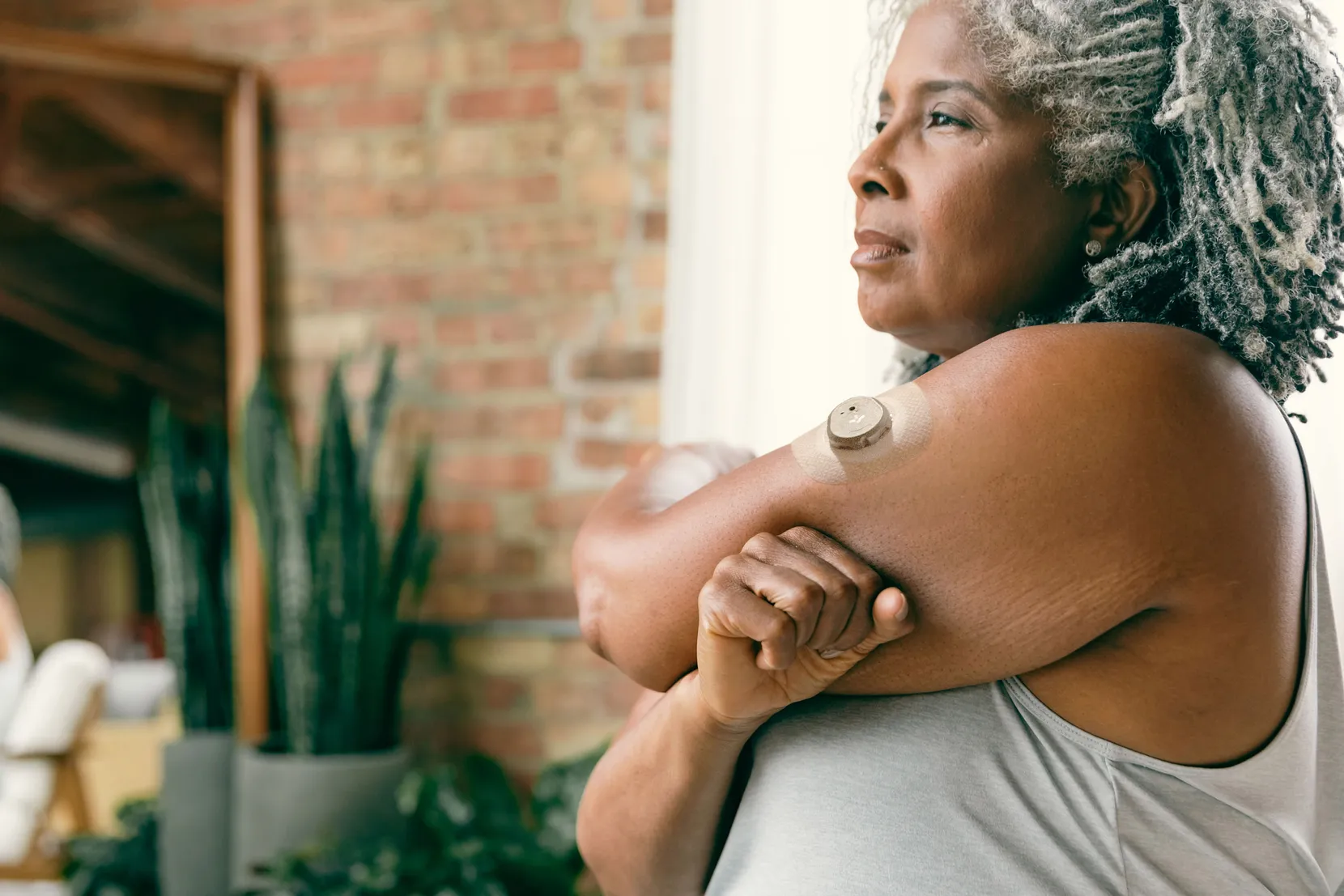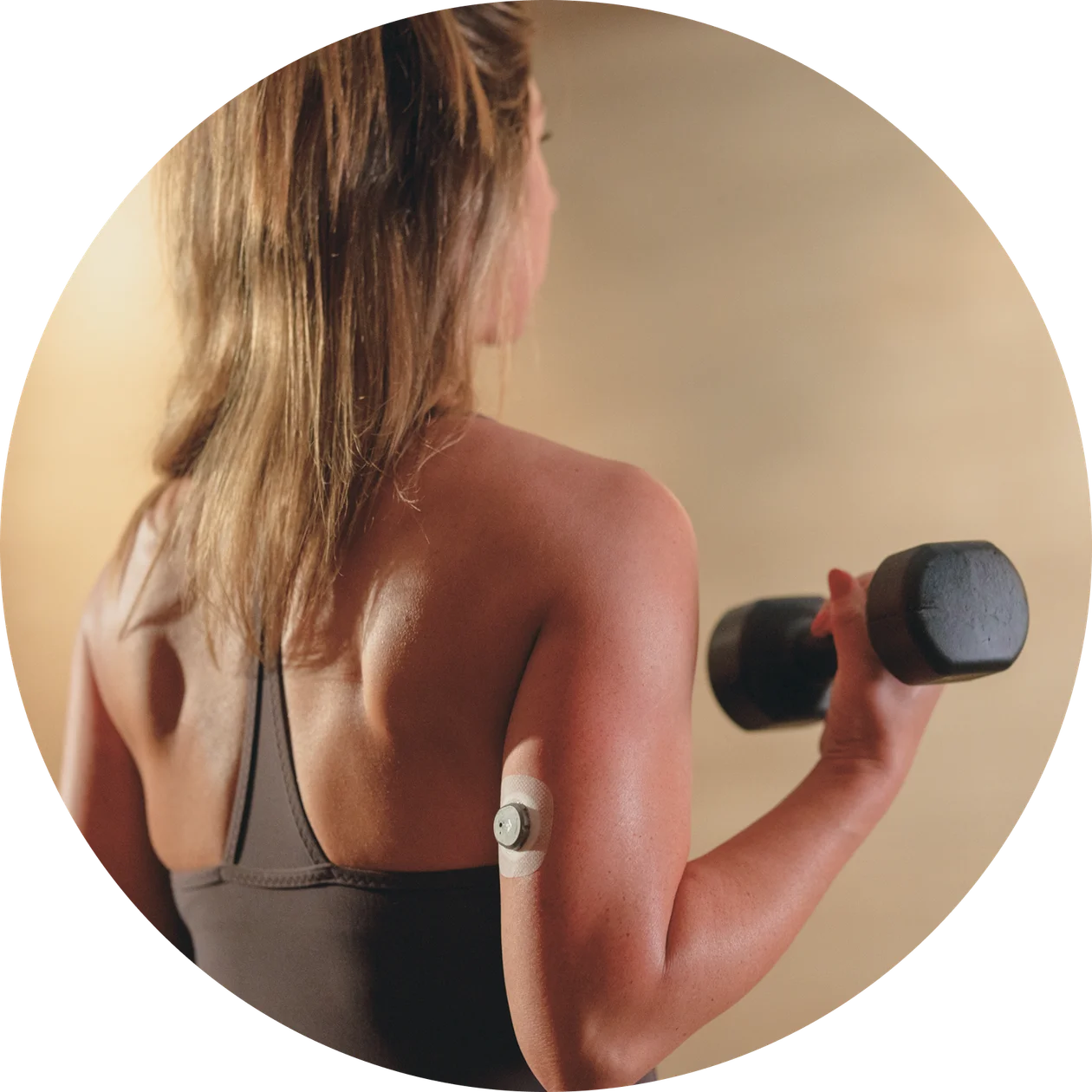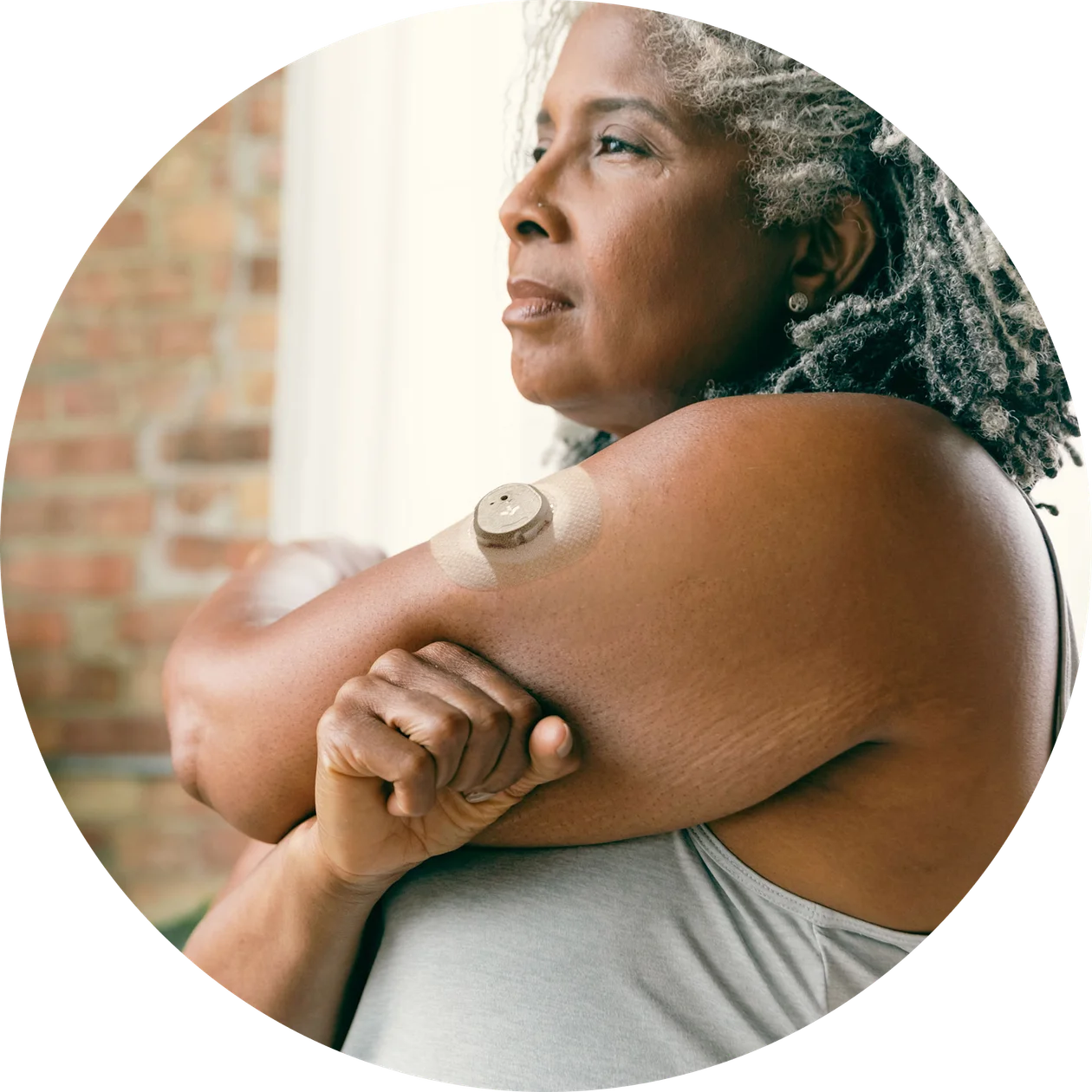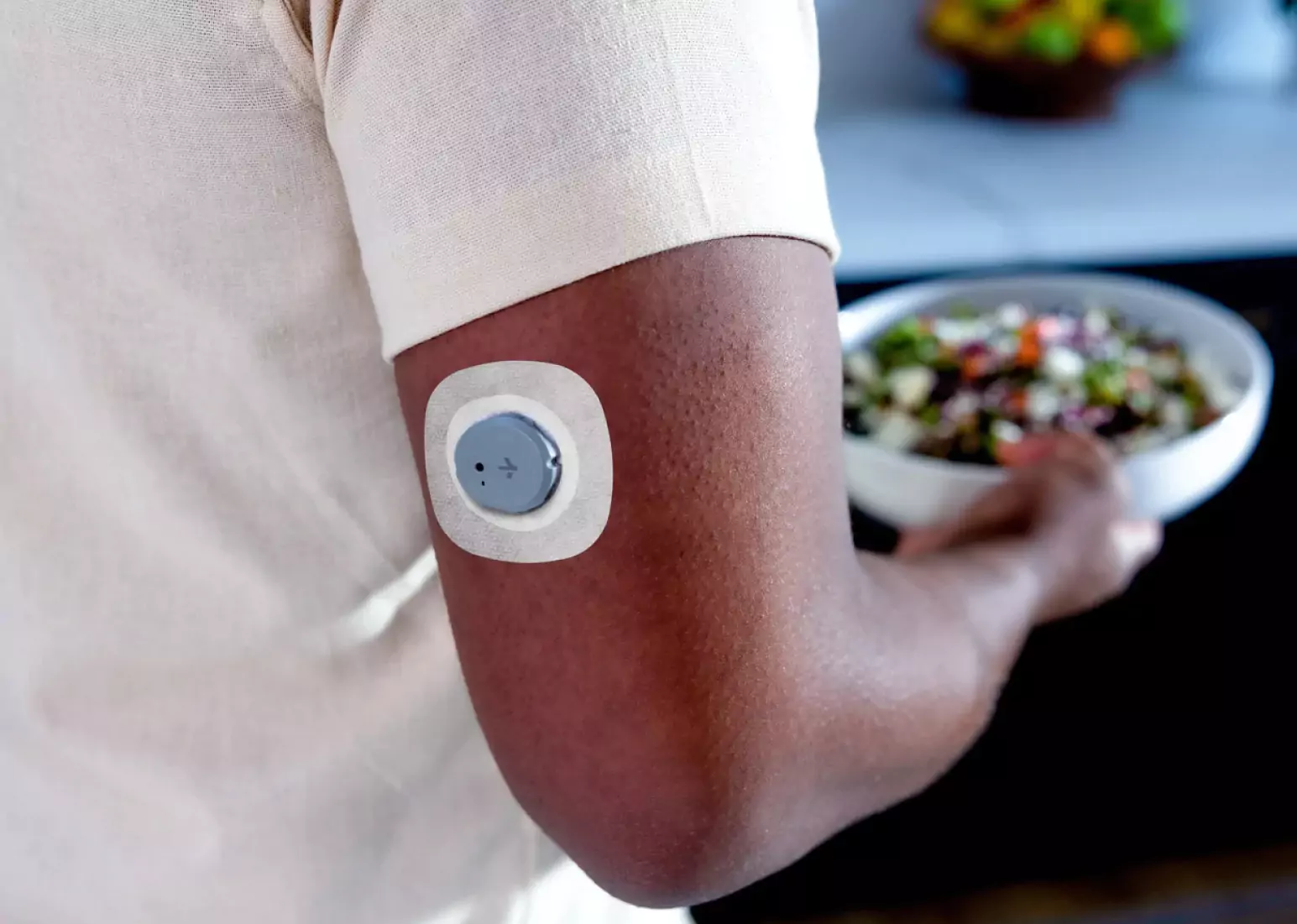Continuous Glucose Monitoring - Definition, Process & Purpose

Continuous
Glucose Monitoring
Continuous glucose monitoring allows you to see how your glucose changes throughout the day. With a CGM, you can spot patterns and trends by observing your body's glucose responses to food, stress, exercise, sleeping habits, and other daily activities.
CGMs can also have non-medical uses as part of a healthy lifestyle that can help you reach your wellness goals, no matter what they may be.

Curious about trying a CGM?
Experiment witheating windows, workout regimens, & macronutrient balance.
Nutrisense arms you with the tools to understand what makes your body tick and make changes that work for....you.
“There are several ways to monitor glucose. You can get a basic lab test at a doctor’s office, or a traditional test strip monitor can measure blood glucose by applying a drop of blood to a chemically treated test strip, which is then inserted into a glucose meter that detects the reaction of the test strip and blood and displays the measurement in units of mg/dl or mmol/L.
The most recent monitors are called CGM or continuous glucose monitoring, which works by inserting a tiny sensory under the skin of the arm or belly, which detects the fluid under the skin basically in between cells, taking measurements every few minutes that are then transmitted wirelessly to a monitor or smartphone.
The last type of sensor that is yet to be readily available and being studied is a noninvasive glucose monitor called Raman Spectroscopy, which uses light to measure glucose simply by touching your skin. There are other versions of glucose monitoring that also use touch in various forms by electrical impulses and light to detect glucose levels as well.”
— Dr. Payam Vahedifar, M.D., physician, pain management specialist
History of CGMs
CGMs were first developed about 20 years ago for people with type 1 diabetes to check their glucose levels. At the time, researchers were seeking new, non-invasive solutions that could allow for more finely-tuned adjustments to insulin.
These sensors were also a way to support guided implementation of dietary and lifestyle changes to help stabilize blood sugar levels. Over the decades, CGMs have improved and the associated costs have decreased, bringing the technology within reach of a broader audience.
Continuous glucose monitors are now becoming increasingly accessible as a consumer tool, and are even available without a prescription in some countries across Europe, as well as in Canada and India.
While the Nutrisense CGM program is not suitable for people with type 1 diabetes, the devices can have beneficial uses as part of a healthy lifestyle for many.

Continuous Glucose Monitor
A CGM device measures your interstitial glucose, or the glucose found in the fluid surrounding your body’s cells. Unlike a traditional blood glucose monitor, or finger prick, a CGM remains in place on your arm for a period of time, measuring glucose levels every few minutes.

How Does a CGM Work?
The CGM tracks glucose levels through a tiny sensor that is painlessly inserted under your skin using a minimally-invasive needle applicator. With the device in place and covered by a protective patch, it can transmit your data to a mobile application like the Nutrisense App.
Some CGM devices come with a transmitter that sends data to a CGM receiver. The CGM receiver may be part of an insulin pump or a separate device altogether.
Continuous glucose monitoring technology has seen immense growth over the last few decades and has now become more accessible to the public. These devices can be worn in water, while flying, and during other activities without hindering your day-to-day life.
You can use a CGM to view how your glucose responds to variables such as food, exercise, stress, and sleep. CGM data works to provide you with the necessary information to monitor your overall well-being and make lifestyle adjustments that can help you reach your health goals.
Your CGM will need to be replaced every few weeks, depending on the brand.
How to Access Continuous Glucose Monitoring
The Nutrisense program provides easier access to anyone who wants to use CGM technology to support their well-being. Not only that, all Nutrisense CGM programs give you the option to work one-on-one with a board-certified registered dietitian or nutritionist through insurance-covered video calls, so you can get a better understanding of your body’s glucose response.
Continuous glucose monitor systems have historically only been available to the public through a medical prescription in the United States but there are not OTC options as well.
Costs for programs like the Nutrisense CGM program can vary depending on the plan you choose.
At this time, the Nutrisense program is not covered by health insurance providers.
Experiment witheating windows, workout regimens, & macronutrient balance.
Nutrisense arms you with the tools to understand what makes your body tick and make changes that work for....you.
“Nutrisense taught me the how, the why, and the when to eat… This program has helped me learn how to keep losing weight and, at the same time, enjoy my food!”

CGM Expectations
Because CGMs read relative changes in your glucose levels with accuracy, they can be a valuable tool for solidifying healthier habits and getting results no matter what your lifestyle currently looks like.
Nutrisense members have used continuous glucose monitoring to track blood sugar level trends, view glucose responses, and customize their diet, athletic performance, exercise approach, and other lifestyle factors in ways that work best for their individual well-being.
See how a CGM may be used as part of a healthy lifestyle to...
Build sustainable habits that improve your well-being
Support healthy blood sugar levels
Reduce the effects of stress
Lose weight
Sleep better
Recommended articles
Your questions
answered.
Still have questions? Here are some answers to a couple of most frequently asked questions.
A continuous glucose monitor is made up of a sensor, transmitter, and is inserted using an applicator that contains a small needle. Once applied to the back of your arm, the CGM device measures your interstitial glucose levels. You can view your data in an app like the Nutrisense App. Sensors will need to be replaced periodically, as specified by your CGM provider. To learn more about the benefits of CGM sensors, click here.
CGM stands for continuous glucose monitor. This small device sits on the back of your arm and tracks your glucose levels 24/7.
The Nutrisense program is designed to help anyone achieve their health goals. Whether you aim to lose weight, thrive through menopause, improve your fitness levels, age well, or optimize your general health, Nutrisense can support you on your journey.
Nutrisense helps you take a deeper look at your health by leveraging 1:1 guidance from an expert personal nutritionist through insurance-covered video calls (if eligible, 95% pay $0 out-of-pocket!) and cutting-edge health technology like glucose biosensors. Plus, you get access to the Nutrisense App, where you can get a 24/7 view of key metrics like your glucose to better understand how your dietary and lifestyle habits may hinder your progress toward reaching your health goals.
Check out what our members are saying about us.
The most affordable CGMs for non-diabetics via the Nutrisense CGM program cost $179 onwards monthly, including app access, monthly glucose biosensor deliveries, and the option to work 1:1 with a registered dietitian or nutritionist through insurance-covered video calls. CGM prices can vary depending on the program length you select. Many insurance providers do not cover CGMs at this time.
A CGM device is the same as a continuous glucose monitor. CGM technology allows you to view and monitor your glucose levels to understand how your food, exercise, and lifestyle habits affect your glucose response.
*Disclaimer: The Nutrisense program is not intended to diagnose, cure or prevent any conditions such as diabetes.





.png)
